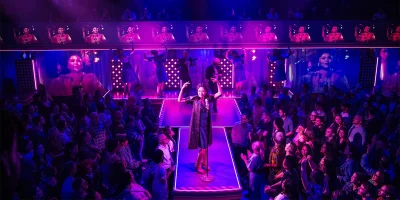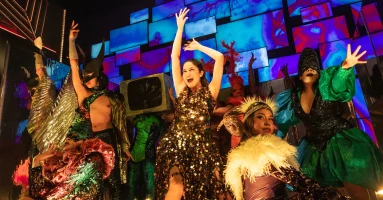
Arielle Jacobs seizes the starring role of Imelda Marcos in ‘Here Lies Love’ on Broadway
The Filipina American actress discusses landing the dream role in the disco musical, working with David Byrne, and her “complicated relationship” with beauty.
For Arielle Jacobs, landing the lead role of former Philippines First Lady Imelda Marcos on Broadway in the musical Here Lies Love is a dream come true.
Jacobs has been chasing Here Lies Love for 12 years. The Broadway production “is my third audition for this piece,” said the actress, who submitted a tape for a developmental workshop before the 2013 world premiere at the Public Theater. “I also did an in-person audition and callback in 2014 when the show was revived at the Public.”
After playing featured characters in Wicked, In the Heights, and Aladdin, Jacobs knows what it’s like to originate a starring role on Broadway – but she relates to this role in a particular way.
“I have played characters who are Native American, Chinese, and Middle Eastern,” said Jacobs, who was born and raised in California. “I’ve done a lot of Latina parts. I’ve never played a Filipino.”
Until now. Jacobs is part of an all-Filipino cast at the Broadway Theatre. It’s a first for Broadway and “a very big deal,” she said, “and a chance to shine a spotlight on our history.” Co-stars include Jose Llana as Ferdinand Marcos and Conrad Ricamora as Ninoy Aquino, a political rival, who reprise their roles from the Public Theater.
Here Lies Love presents Imelda in all of her controversial complexity. The show traces her rise and fall alongside her husband, Ferdinand Marcos, who was elected president of the Philippines in 1965 and declared martial law seven years later. The People Power Revolution in 1986 forced the Marcoses out of their dictatorship and into exile.
Songwriters David Byrne and Fatboy Slim, director Alex Timbers, and choreographer Annie-B Parson have turned that fraught slice of history into an immersive disco- and dance-driven musical that expends even more energy than Imelda on the dance floor of Studio 54 or shopping in one of her multi-million dollar shopping sprees. (Yes, they happened.)
New York Theatre Guide talked with Jacobs about bringing Imelda Marcos and Here Lies Love to life on Broadway.
How did you prepare to play Imelda Marcos?
I did more historical research for this than ever before. This role is more complex and immense than anything I’ve done. I feel a responsibility to rise to the challenge. I was really blessed because the producing team put together a database for the entire cast. Every single song in the show has a separate chapter on this website with photos and videos and primary-source testimonials.
Describe what being part of the first all-Filipino cast on Broadway means to you.
It feels huge. It feels so big for all of us. Many of us, myself included, weren’t told about this history. My mom came from the Philippines but she didn't talk about it. That’s the same for a lot of my cast and a lot of people who I’ve met who aren't in the show.
Imelda is still alive, and her son is now president of the Philippines. How does that affect the way her story resonates today?
There’s so much happening out there now that puts democracy at stake. This show is important because it’s really getting people to question how they can be more in control of their destiny, how they can be more aware of the people that they're putting in power.
The show is definitely a pro-democracy piece and a cautionary tale about electing charismatic leaders without really looking at their motivation. This show wants you to go through the ride of rooting for [the Marcoses] and then question what happens when you root for the wrong person. How will that affect you and your life moving forward?
What’s it like working with David Byrne?
David’s always here. One of my favorite things is that he’s so passionate about this show and loves it so much. I wear ear monitors so I can hear myself better and not just rely on the sound from the speakers. There was a day where I was tech-ing sound onstage for "Opposite Attraction," a duet with Conrad, who wasn’t there. As I was singing through the first verse, David Byrne ran in from backstage, and he was like, "Put me in, coach!" He took Conrad’s part. He just loves the music so much that he wants every opportunity to sing it.
What’s it like performing on David Korins’s gleaming disco dance club set?
You feel the magnitude of the experience, and it’s really fun. There are stages all around the theatre – they surround the dance floor, they’re in the front and rear mezzanine. The ensemble dancers are running up and down stairs to get to the satellite stages. There are telescoping platforms that are automated and open and close. IMAG (image magnification) projections around the theatre make the action feel really close, even if you’re far away. And there’s the lights – so many of them.
Why the focus on disco?
David Byrne tells the story about when he first heard that Imelda had a disco ball installed in her New York penthouse apartment. She definitely threw her own private dance parties. When he discovered that Imelda had a disco ball and that she liked to go to the nightclub-turned-theatre Studio 54, he thought, "Wow, I think maybe these two things could work together." And they do.
It’s next-level immersive, yes?
Yes. This show is different because, in this one, the audience has roles. The audience is cast as people who attended the wedding of the Marcoses, people who were part of the campaign trail, and people who were part of the revolution. The audience really does get to participate in such a deeper way.
Imelda Marcos is indelibly linked to shoes. Do you get asked about footwear?
Yeah, people who haven’t seen the show say, "Oh, you must get to wear fabulous shoes." I actually don’t wear fabulous shoes in the show. What’s interesting is that when I saw the documentaries about her 3,000 pairs of shoes, they weren't out-of-this-world, extravagant-looking shoes. They were basic, solid-color black or tan or whatever. The shoes are not in this production specifically because it ends with the helicopter when Imelda gets taken away. The shoes were not discovered until about three hours after that.
What have you learned about yourself by playing Imelda?
Imelda placed high value on beauty. I’ve had a complicated relationship with beauty my entire life. About 10 years ago, I got Bell's palsy. So I had a few months where half of my face was paralyzed, and I couldn’t smile. I had always felt attractive, and then suddenly, like my face was lopsided. I couldn’t communicate. I couldn’t express myself. I thought, "All I want is to be able to smile again."
After my face miraculously came back, the whole standard of beauty was so different for me. I didn't feel like I had to put on makeup to be beautiful. Just to have a face that can fully express itself is beautiful.
What’s your takeaway from Here Lies Love?
It can feel very disheartening today with what's happening with democracy. I hope that this show gives people a sense of empowerment. Imelda does rise and fall, but it's also the story of the Filipino people who stood up against the regime. The Filipino People Power Revolution was a peaceful revolution. They really did stand up for themselves. It took years, but change did happen.
Photo credit: Arielle Jacobs. (Photo by Matthew Murphy)
Frequently asked questions
What is Here Lies Love on Broadway about?
David Byrne and Fatboy Slim's disco pop musical comes to Broadway 10 years after its hit Off-Broadway premiere. The Broadway Theatre becomes an immersive dance club, where the audience grooves along as the story of Filipina First Lady Imelda Marcos's reign unfolds around them. Find out more about tickets to Here Lies Love on Broadway.
Where is Here Lies Love on Broadway playing?
Here Lies Love on Broadway is playing at Broadway Theatre. The theatre is located at 1681 Broadway, New York, 10019.
How long is Here Lies Love on Broadway?
The running time of Here Lies Love on Broadway is 1h 30m
What's the age requirement for Here Lies Love on Broadway?
The recommended age for Here Lies Love on Broadway is Recommended for ages 14+. Children under 4 are not permitted in the theater..
How do you book tickets for Here Lies Love on Broadway?
Book tickets for Here Lies Love on Broadway on New York Theatre Guide.
Who wrote Here Lies Love?
Former Talking Heads frontman David Byrne and big beat musician Fatboy Slim wrote Here Lies Love. Byrne wrote the music and lyrics and came up with the concept, and Slim wrote additional music.
What songs are in Here Lies Love?
Some of the best-known songs in Here Lies Love include the title song, "The Rose of Tacloban," and "Just Ask the Flowers." There are 25 songs in all, and the show is entirely sung through.
Is Here Lies Love appropriate for kids?
Here Lies Love is recommended for ages 14 and up. On the dance floor, parties often get separated as the audience moves around, so parents and children could be separated. The show also contains themes of political unrest and death.
Who is Imelda Marcos?
Imelda Marcos was First Lady of the Philippines from 1965-86. She and her husband, former President Ferdinand Marcos, are largely remembered for their martial-law regime and various other political controversies. Here Lies Love tells the story of her rise and fall from power with disco music, a nod to her large presence in the New York disco scene following her rule.
What is the name of the album Here Lies Love is based on?
The Here Lies Love musical is based on an album of the same name. The album came out in 2009, and David Byrne and Fatboy Slim adapted it for the stage in 2013.
What is the difference between standing tickets and seated tickets at Here Lies Love?
Standing tickets place audiences on the ground-level dance floor, where they stand the whole time and move around the room at different points during the show. Seated tickets are for the traditional theatre seats in the mezzanine level. Learn more about the experience of Here Lies Love from the standing and seated sections.
Who directed Here Lies Love?
Alex Timbers directs Here Lies Love on Broadway. He is also credited with developing the show. He also staged the Off-Broadway premiere in 2013, and his other Broadway directing credits include Beetlejuice and Moulin Rouge! The Musical.
Is Here Lies Love good?
Here Lies Love is among the best-reviewed shows on New York Theatre Guide. Our four-star review reads, "This rollicking, form-breaking musical party is well worth an RSVP," additionally praising the choreography, design, and performances.
Originally published on


